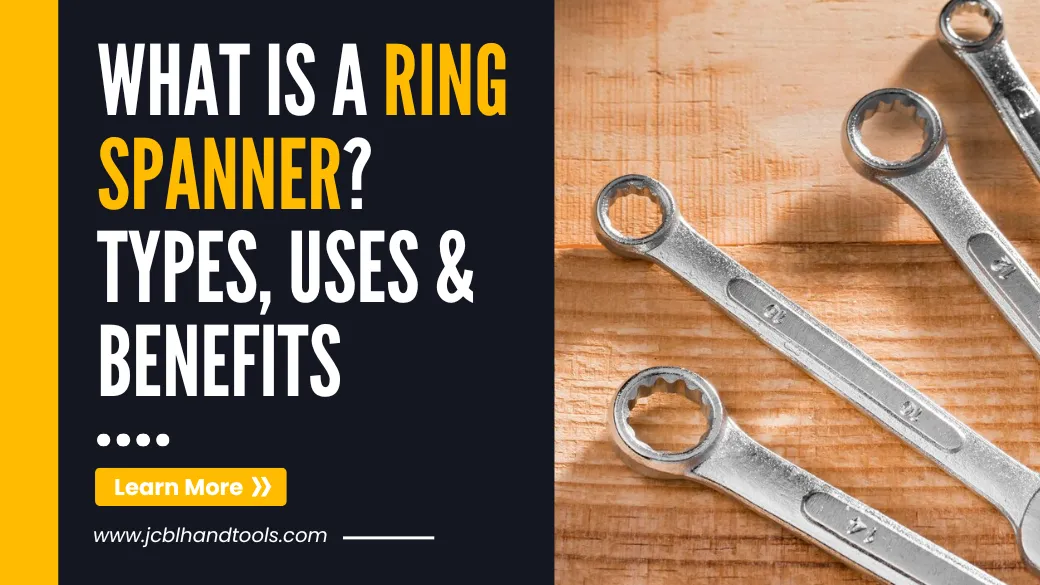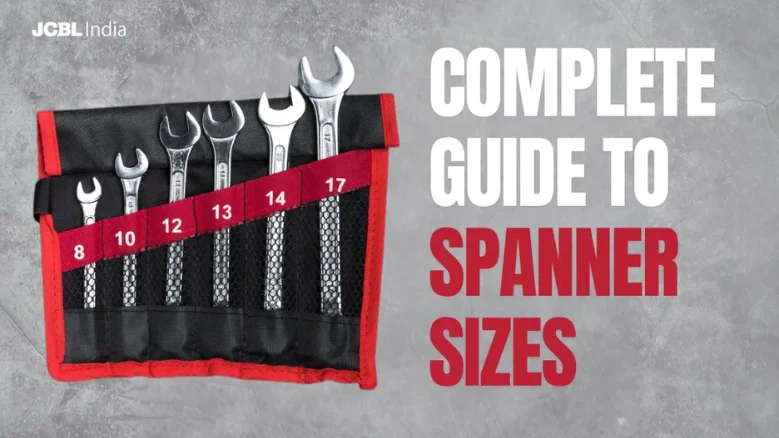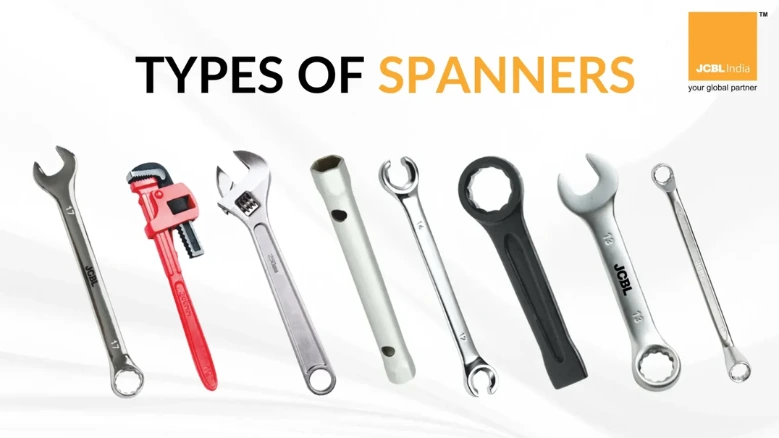Box Spanner vs. Ring Spanner: Key Differences and When to Use Them

In the world of mechanical and automotive tools, spanners play a crucial role in loosening and tightening bolts and nuts. However, not all spanners are created equal. Among the different types, box spanners and ring spanners are two commonly used tools, each with distinct features and applications.
If you’ve ever wondered which one to use for a specific task, this comprehensive guide will help you understand their differences, strengths, and the best situations to use them. By the end of this blog, you can make an informed decision when choosing the right spanner for your needs.
What Is A Box Spanner?
A box spanner is a tube-shaped tool with hexagonal or bi-hexagonal ends that fit over a nut or bolt. These spanners are often used with a tommy bar, a rod inserted through holes in the spanner, to provide additional leverage. Its tubular design allows it to fit over long bolts and reach deep-set nuts. Also, hexagonal or bi-hexagonal openings of a box spanner ensure a firm grip on nuts and bolts, further reducing the chances of slipping. Some common applications of box spanners include plumbing, automotive repair, and DIY & home repairs.
Advantages of using a box spanner
Box spanner offers several advantages:
- Better for deep-seated fasteners: Due to its hollow design, it can reach nuts in recessed areas.
- Distributes force evenly: Reduces wear and tear on fasteners, preventing rounding of edges.
- Easy to use with a tommy bar: Allows increased torque application with less effort.
- Suitable for confined spaces: Ideal for applications where a regular spanner cannot fit.
Want to learn more about box spanners, then read
What Is A Ring Spanner?
A ring spanner is a closed-loop tool designed to fit hexagonal or bi-hexagonal nuts. The ring-shaped head completely encloses the nut, providing a strong grip and reducing the chance of slippage. Its closed-loop design offers full contact with the nut or bolt, providing better torque control. It comes in 6-point and 12-point designs to provide a stronger grip and easier positioning. Some ring spanners have an offset head, making them easier to use in tight spaces. The ring spanner is widely used in heavy machinery maintenance, construction work, and metalwork.
Advantages of Ring Spanner
- Stronger grip on fasteners: The closed-loop design prevents slipping, even on stubborn bolts.
- More torque with less effort: Provides better leverage for loosening tight or rusted fasteners.
- Prevents damage to bolt heads: Reduces the risk of rounding off nuts and bolts.
- Versatile and widely used: Commonly found in automotive, mechanical, and industrial applications.
Want to learn more about ring spanners, then read
Box Spanner Vs. Ring Spanner: Key Differences
While both spanners serve similar purposes, they are designed for different applications. Below is a comparison table highlighting the key differences:
Design
Box spanners have a tubular design that allows them to fit over nuts and bolts, making them ideal for deep-seated fasteners. The hollow structure enables access to long bolts, a feature not available in other spanners. Ring spanners, on the other hand, have a closed-loop design that completely encloses the nut or bolt, providing a more secure grip. While box spanners work well in confined spaces, ring spanners offer better torque control and are more suited for high-torque applications in automotive and industrial settings.
Grip
The grip provided by a box spanner is firm but depends on the tommy bar for additional leverage. It prevents slippage by surrounding the nut securely but can be slightly less secure than a ring spanner. Ring spanners provide superior grip due to their enclosed design, which distributes force evenly around the fastener. This minimizes the risk of rounding off bolts and ensures a stronger hold, especially when dealing with rusted or tight bolts that require extra force to loosen or tighten.
Torque Application
Torque application differs significantly between the two types. Box spanners are designed for moderate torque applications, making them useful for plumbing and light mechanical tasks where excessive force is unnecessary. Ring spanners, however, excel in high-torque situations. Their closed-loop design allows for even distribution of force, reducing wear on fasteners and enabling mechanics to apply greater torque with minimal risk of slippage. This makes them a preferred choice for automotive and heavy machinery repairs.
Suitability
Box spanners are suitable for tasks where nuts are located in deep or recessed positions. They are commonly used in plumbing, small machinery, and household repairs. Their design makes them perfect for hard-to-reach fasteners. In contrast, ring spanners are ideal for exposed bolts and nuts that require significant torque. They are widely used in the automotive industry, construction, and heavy-duty applications. If a job involves rusted or tightly fastened bolts, a ring spanner is the best tool to use.
Durability
Box spanners are generally lightweight and made of thinner metal, which makes them easy to use but less durable than ring spanners. Since they rely on a tommy bar for leverage, they may not withstand extreme force or heavy-duty applications. Ring spanners, in contrast, are built for durability. Made from high-strength steel, they can handle substantial pressure and last longer, even in demanding industrial environments. Their robust build ensures they maintain their effectiveness over years of heavy use.
Applications
Both spanners have specific applications that make them valuable in different settings. Box spanners are ideal for plumbing, bicycle maintenance, and small machinery repairs where access to deep nuts is essential. They are also useful in confined spaces where other spanners might not fit. Ring spanners, however, are favored in automotive repairs, heavy machinery maintenance, and construction work. Their ability to handle high torque makes them indispensable for professionals dealing with tight, rusted, or heavy-duty fasteners.
When to Use Each Spanner?
Choosing the right spanner depends on the type of work and the specific fastener you’re dealing with.
Use a box spanner if:
- The nut or bolt is located in a deep or recessed area.
- You need a lightweight tool that’s easy to maneuver.
- You’re working on plumbing, electrical, or small machinery where precision is key.
Use a ring spanner if:
- The fastener is tight, rusted, or requires high torque to loosen.
- You want a secure grip with minimal risk of slippage.
- You are working on automobiles, construction, or industrial equipment that requires heavy-duty tools.
How To Choose the Right Spanner
When selecting between a box spanner and a ring spanner, consider the following factors:
- Nature of the Job: If you need to access a recessed nut, a box spanner is ideal. For high-torque applications, choose a ring spanner.
- Work Environment: If you’re working in tight spaces, a box spanner’s long reach is beneficial. For exposed fasteners, a ring spanner works best.
- Bolt Condition: Rusted or stubborn bolts require the superior grip of a ring spanner.
- Tool Quality: Investing in high-quality hand tools ensures durability, safety, and efficiency.
Conclusion
Both box spanners and ring spanners have their unique advantages. The choice depends on the nature of your work and the type of fasteners you’re dealing with. Ideally, having both in your toolbox ensures you’re always prepared for different tasks.
If you’re looking for premium-quality hand tools, JCBL Hand Tools offers a wide range of durable, high-performance spanners that cater to both professionals and DIY enthusiasts.
Visit our website today to check our collection and get the perfect spanner for your needs! With the right tool in hand, you can tackle any job with confidence and precision.
For any queries, contact us at +91-9815579321 or email us at handtools@jcbl.com.
FAQs
Can I use a ring spanner instead of a box spanner?
Yes, but it depends on the application. A ring spanner provides better grip and torque, while a box spanner is better for reaching deep-seated fasteners.
Are box spanners suitable for heavy-duty work?
Box spanners are great for light to moderate tasks but may not withstand heavy-duty applications where high torque is required.
Which spanner is best for plumbing work?
Box spanners are ideal for plumbing since they can reach recessed nuts and pipe fittings easily.
How do I maintain my spanners?
Keep them clean, store them in a dry place to prevent rust, and use the correct size for each job to avoid damage.
Are ring spanners better for automotive repairs?
Yes, ring spanners provide a strong grip and high torque, making them perfect for automotive maintenance and repairs.




